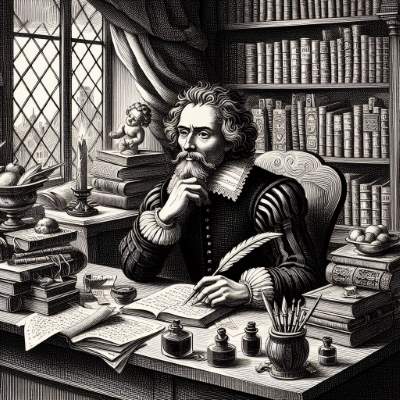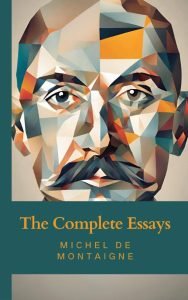
Just the other day I found myself lost in a winding daydream, as my mind drifted this way and that without much direction. I had been trying to focus on a tedious report for work, but found my attention straying as thoughts of weekends plans and half-finished to-do lists paraded through my head. Before I knew it, I looked up to find the sun lower in the sky and my stomach rumbling – hours had slipped by in this wandering mental state.
It was in that moment, jarred from my daze, that I realized how much time we unthinkingly lose to mere mindless drifting each day. Our busy lives leave little space for truly thoughtful contemplation and reflection. This got me thinking about philosophers who dedicated their lives’ work to such inward examination – none more so than Michel de Montaigne. As the originator of the essay form, Montaigne was a master of sorting through scraps of ideas, experiences, and questions that flitted through his mind each day.
“The greatest thing in the world is to know how to belong to oneself.”
Michel De Montaigne
Through his writings, Montaigne practiced a relentless and rigorous form of self-exploration. He dissected his own judgments, behaviors, and shifting states of mind with penetrating introspection. His essays pulled no punches in laying bare his flaws, inconsistencies, and moments of sheer human fallibility. In doing so, Montaigne taught us the importance of taking time each day for thoughtful reflection on who we are and how we experience the world. Almost five hundred years later, his reminders about living an examined life feel more urgent than ever…
What Are The Essays Of Michel De Montaigne?
Now, as an eccentric French nobleman living during the 16th century Renaissance period, Montaigne had the rare luxury of pursuing lofty intellectual pursuits without the distraction of earning a living. Retiring to his family’s estate tower, he embarked on an experiment of writing himself down exactly as he was – warts and all, you might say.
In his essays, Montaigne explored an endless variety of topics, bouncing from the trivial to the profound without warning or care for structured arguments. He changed and challenged his own positions frequently, always grappling openly with inconsistencies as his thinking developed. More than anything, Montaigne was curious – about history, philosophy, politics, culture, and of course human nature in all its bizarre glory. He pioneered a new literary form of informal, personal meditations that let his brilliant yet wandering mind roam as it pleased.
Importantly, Montaigne saw value not just in examining lofty ideals or great men, but in scrutinizing his own banal thoughts and mundane activities. From how he brushed his teeth to his musings about cannibalism, no pebble was left unturned in the quest for self-knowledge. His casual yet insightful essay masterpieces blend deep wisdom with biting wit, forever changing how we view introspection and the examined life. Almost five centuries later, Montaigne’s wisdom still feels wonderfully unconventional and ahead of his time. Perhaps now more than ever, we could benefit from making time each day for his kind of thoughtful self-reflection.
Download The Complete Essays of Michel De Montaigne For Free

Penned in the late 16th century by one of history’s greatest intellectuals, Montaigne’s Essays tackle wide-ranging topics with curiosity, humor, and profound philosophical depth. Across over 100 or so short chapters, Montaigne explores questions around education, war, cannibals, friendship, ancient customs, and so much more – all through his unique lens of keen observation, self-reflection, and tolerant skepticism.
What makes the Essays so compelling, even 400+ years later, is their intensely personal and candid style. Montaigne sought to “paint natural and common actions” and introduce readers to his inner workings, faults, and contradictions. The result is a timeless masterwork that still inspires and educates through its down-to-earth honesty and perspective on the follies of mankind.
You can access this unparalleled work completely free in easy-to-read digital formats. Simply download the ePub or PDF version available online and you’ll have Montaigne’s Essays at your fingertips wherever you go – on your phone, tablet or desktop. Immerse yourself in Renaissance thought anywhere, anytime, without spending a penny.
How To Read Montaigne’s Essays
The nature of Montaigne’s essays lends them well to haphazard reading. Much like our own thoughts wander over the course of a day, his contemplations float from subject to subject in a winding but enlightening stream. There is freedom and value to be found in simply opening to a random page and diving in, seeing what insights or questions arise without forethought.
For those seeking a bit more direction, Montaigne’s volumes can still be approached in a non-linear yet thoughtful way. The complete works make a long read but there are insights on all of them, especially if you enjoy French military operations.
With each essay standing independent of the next, readers are free to choose selections that most pique their curiosity or truly suit their mood in the moment.
His works also reward returning to with fresh eyes over the seasons or years. A essay that irked or confused last summer may spark newfound wonder in winter’s slow days. Like life itself, Montaigne’s contemplations offer new layers and connections with every reading as our own perspectives evolve.
However one chooses to navigate Montaigne is less important than letting his reflections provoke our own. As in his aimless perambulations across different fields of thought, getting lost in wondering is the true path to discovering new dimensions of yourself.
So pick up an essay, any essay, and see where the journey leads – that is how best to read, and reap reward from, this master of human experience.
Self Reflection In The Modern World
In closing, Michel de Montaigne’s essays remain a timeless gift, offering readers centuries later the opportunity for thoughtful self-reflection. His lessons feel more vital than ever in our modern world, which barrels ahead so quickly yet leaves little time for intimate understanding of what it means to be human.
Through Montaigne’s example, we see the value in being lifetime students of ourselves, maintaining a sense of curiosity, fallibility and growth. His willingness to question even firmly held beliefs with compassion is poignant at a time when we too often converse past one another. Most of all, Montaigne reminds us of the importance of slowing our wandering minds enough to simply wonder – about ourselves, each other, and Life’s deepest mysteries.
His casual essays invite readers to embark on their own winding journeys, following inquisitive trails wherever they may lead. I encourage picking up Montaigne whenever uncertainty, contradiction or life’s endless fascinating complexities stir reflection. Let his wisdom and humor stimulate questions rather than answers; remind us that self-knowledge is a lifelong pursuit with no defined end. In this blended spirit of sincere introspection and acceptance of our shared humanity, readers will find Montaigne as relevant as ever. His works continue to offer the perfect doorway to lazy, thoughtful days and a life examining what it means to be.
